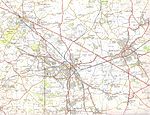George Eliot Hospital
Buildings and structures in NuneatonDefunct museums in EnglandHospital buildings completed in 1948Hospitals established in 1948Hospitals in Warwickshire ... and 1 more
NHS hospitals in England

George Eliot Hospital is a single site hospital located in Nuneaton, Warwickshire, it is managed by the George Eliot Hospital NHS Trust. It provides a full range of emergency and elective medical services, including maternity services, to the local area. The Hospital is one of many local buildings named after Nuneaton-born author George Eliot. Additionally, many of the hospital's surgical and medical wards are named after characters within George Eliot novels (e.g. Felix Holt, Arbury lodge, Caterina, Adam Bede, Dolly Winthrop). The Hospital also has a set of operating theatres on the first floor.
Excerpt from the Wikipedia article George Eliot Hospital (License: CC BY-SA 3.0, Authors, Images).George Eliot Hospital
Eliot Way, Nuneaton and Bedworth Bermuda
Geographical coordinates (GPS) Address External links Nearby Places Show on map
Geographical coordinates (GPS)
| Latitude | Longitude |
|---|---|
| N 52.5108 ° | E -1.4757 ° |
Address
George Eliot Hospital
Eliot Way
CV10 7RH Nuneaton and Bedworth, Bermuda
England, United Kingdom
Open on Google Maps








